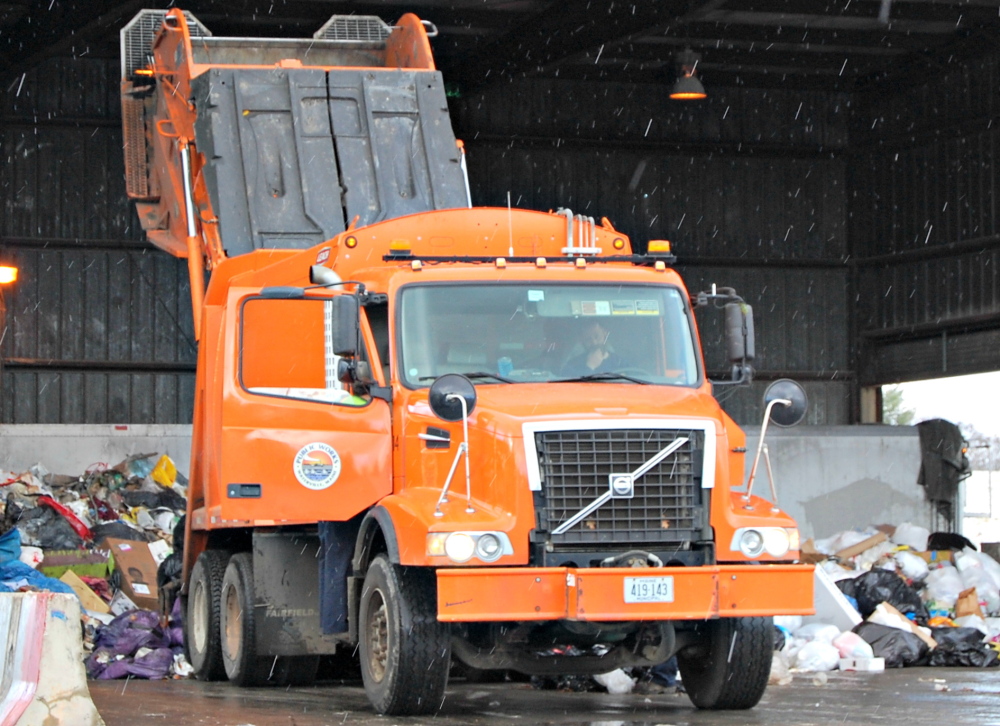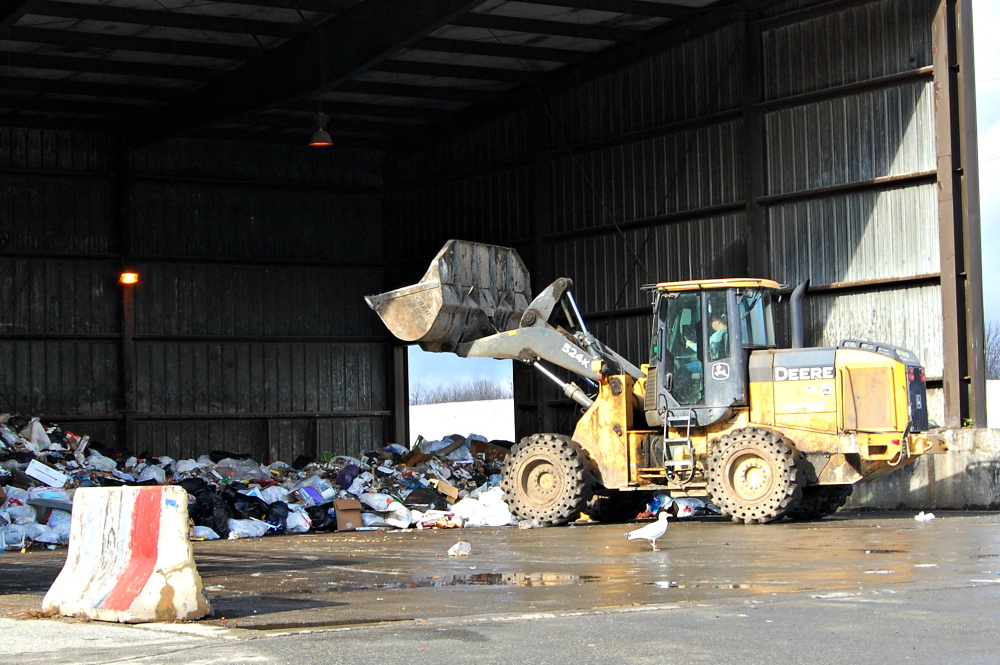OAKLAND — Waterville’s experiment with pay-as-you-throw garbage collection is not only cutting down on trash output in the Elm City, it’s also cutting into a revenue source for neighboring Oakland.
Oakland officials estimated this week that Waterville’s decreased trash output would cost their transfer station roughly $10,000 a year in fees Oakland charges to load Waterville’s trash onto trucks bound for the Penobscot Energy Recovery Company in Orrington.
Waterville dumps its trash at the Oakland station, and has recently been paying the town more than $25,000 a year for the service.
Since pay-as-you-throw took effect in September, Waterville’s trash output has declined 48.8 percent compared to last year as of Friday.
That’s a reduction of 458.24 tons, meaning a loss of revenue for Oakland’s transfer station of $2,749 thus far.
While even the $10,000 projection accounts for just 2.5 percent of the transfer station’s total budget of $396,569 this fiscal year, $129,000 of that budget — 32.5 percent — is slated to come from revenue generated by the transfer station itself.
Overall, the town council budgeted a total of $44,000 in transfer-station revenue for handling garbage from Waterville and Winslow this year. And with Winslow exploring options for starting its own pay-as-you-throw program, Oakland’s transfer station could face further revenue declines in the future.
The Winslow Town Council formed a three-member subcommittee this week for exploring the possibility of pay-as-you-throw.
“Unfortunately, pay as you throw is just an incentive for people to recycle,” Winslow Town Manager Michael Heavener said at the time. “I think if we’re really thinking about recycling, we have to at least give some consideration to pay as you throw.”
In Oakland, town officials are taking a wait-and-see approach — a referendum on the fate of Waterville’s pay-as-you-throw program goes before Waterville’s voters in June.
Oakland Town Manager Gary Bowman said the town is “on the cusp of something happening,” but he does not want to make any sudden changes without further investigation.
“We’re kind of at this don’t jump stage,” Bowman said. “You know, if you don’t know the answer, maybe the best thing to do is wait and see where things are going. That way we don’t lose what we have and we’re not committing to something that we might lose money at.”
As Winslow ponders the question of pay-as-you-throw garbage, nearby Benton and Clinton are considering single-stream recycling, which would eliminate the need for residents to sort their recyclables.
Benton Selectman Antoine Morin said the hope is that making recycling easier will increase participation and reduce the amount of garbage the town must pay to haul away.
Oakland transfer station manager John Thomas advised the Oakland council this week not to jump on single-stream recycling as a means to reduce garbage output.
While it could increase recycling, he said, it could also cost the town money in the long run, cutting into the revenue Oakland makes by selling its sorted recyclables.
“Once they got us, they can say we want $100 a ton,” he said. “What are you going to do? You’re not going to train people again once we got to single stream.”
While debate over pay-as-you-throw garbage and single-stream recycling continues locally, the programs are by no means new ideas, according to Eric Conrad, director of communications and educational services for the Maine Municipal Association.
Conrad said Portland went to a pay-as-you-throw system in 1999.
Statewide, 417,000 Mainers — approximately 31 percent of the state’s population — live in pay-as-you-throw communities, according to an article to be published Monday in “Maine Townsman,” a municipal association publication.
“It is partly being environmentally friendly,” Conrad said of the movement toward pay as you throw, which he said continues to build momentum.
He also says it’s a form of cost control, reducing the amount of garbage for which cities and town must pay for disposal.
“Part of pay per throw and the whole movement is to kind of remind people that that’s not free,” Conrad said. “You do pay for it through your taxes and then your towns and cities have to pay people to get rid of it.”
Conrad acknowledged that a reduction in state revenue sharing has municipalities looking to save money wherever they can.
Evan Belanger — 861-9239
ebelanger@centralmaine.com
Twitter: @ebelanger
Copy the Story LinkSend questions/comments to the editors.




Success. Please wait for the page to reload. If the page does not reload within 5 seconds, please refresh the page.
Enter your email and password to access comments.
Hi, to comment on stories you must . This profile is in addition to your subscription and website login.
Already have a commenting profile? .
Invalid username/password.
Please check your email to confirm and complete your registration.
Only subscribers are eligible to post comments. Please subscribe or login first for digital access. Here’s why.
Use the form below to reset your password. When you've submitted your account email, we will send an email with a reset code.